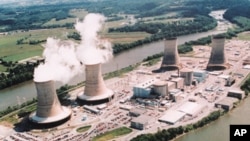The problems at Japan's nuclear power plants following the earthquake and tsunami hearken back to the Three Mile Island nuclear accident 32 years ago. Participants in that event say there are similarities between that accident and the events at Japans' Fukushima reactors, but there are also stark differences. Our correspondent, who covered the U.S. nuclear mishap, reports that in both cases, there was political as well as physical damage.
In the predawn hours of Mar. 28, 1979, a stuck valve at one of the two nuclear power reactors at Three Mile Island in Pennsylvania set off a chain of events leading to the world’s first commercial nuclear power plant accident.
The U.S. Nuclear Regulatory Commission, or NRC, blamed the accident on a combination of equipment malfunctions, design-related problems and worker errors. No one was killed or injured at the plant or in the nearby communities. But it was nevertheless a harrowing time as the United States tried to come to grips with something that had never occurred before.
As news of the accident spread during six tense days, public unease was widespread. Richard Thornburgh, who was governor of Pennsylvania at the time, says he initially gave out misleading or confusing information because he had to rely on what he was being told by the power company that ran Three Mile Island. He asked for help from Washington and got it, in the form of an NRC nuclear engineer who Thornburgh labels the hero of Three Mile Island.
"It was a very, very stressful time up until Friday March 30, 1979, with the arrival of Harold Denton who was dispatched at my request by President Carter," said Thornburgh. "He was an engineer, a career engineer with the NRC. He became our principal source thereafter and it made a big difference."
To a nervous public that was also angry over the initial stream of misleading information, Denton was a calm and reassuring voice, who spoke with authority and credibility. Denton, now 79 and retired from the NRC, says he had official backing to speak candidly to the public about the disaster at Three Mile Island, which he refers to as TMI.
"I really had a unique role at TMI, looking back," said Denton. "And to have the backing that I had from President Carter and Governor Thornburgh sort of gave a certain legitimacy to what I was reporting every day. And I just tried to tell it like it was. You may not have that opinion. But that was the goal for the three weeks I was up there. And I came in at the right time because the power company had lost certainly part of its credibility by not recognizing the seriousness of the accident at the beginning."
Three Mile Island did not happen because of an earthquake and tsunami, as occurred in Japan. Denton said the Fukushima reactors have suffered far greater damage and resulted in more radiation emissions than at Three Mile Island. And Denton points out a crucial difference between the two disasters - Three Mile Island never lost its power supply, as has happened at the Japanese plant.
"TMI had power," he said. "Infrastructure was such that people could move in immediately personnel and equipment as needed. In Japan, they didn’t have that luxury like I had. So there were a number of differences."
However, Thornburgh says the technical challenges of trying to bring either Three Mile Island or Fukushima under control and prevent radiation leaks are virtually the same. And so, too, are the challenges of getting good information and maintaining credibility with a worried public. He says Japanese officials are learning that the hard way.
"Re-examine your sources," he said. "You can be the best decision maker in the world, but if you are making a decision on facts that are wrong, it’s not worth a thing. Because the basic premise of any decision you’re making and handling is that you understand the facts and got them firmly in your grip. If you don’t, you’re in big trouble. They found this out a couple times already."
As Harold Denton points out, the Three Mile Island accident led to a loss of public confidence in the nuclear power industry not just in the U.S. but abroad.
"TMI resulted in a lot of people losing confidence in the industry and its safety," said Denton. "And we haven’t had a new plant come into operation in this country in 30 years. And it wasn’t just the fear of [nuclear] plants, but it was economics. Plants got very expensive compared to, say, natural gas, as a fuel."
Denton and other analysts rank the Fukushima disaster as worse than Three Mile Island, but not as severe as the 1986 Chernobyl nuclear accident in the Ukraine. But they say the damage to public confidence in nuclear power may be comparable to both previous accidents.
Earlier US Nuclear Accident Provides Lessons for Japan Disaster
- By Gary Thomas















